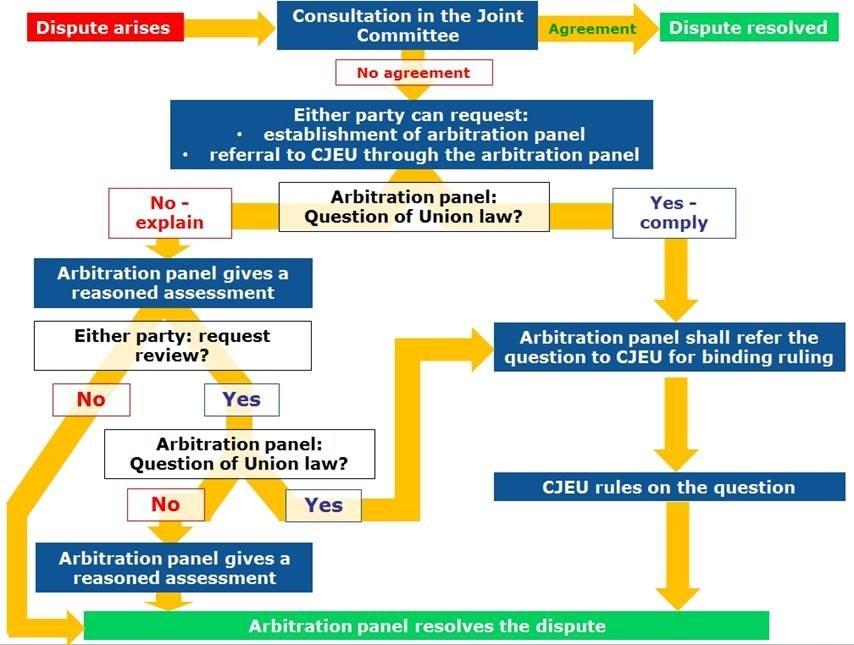Brexit Arbitration? Dispute Settlement Under the European Union and United Kingdom Withdrawal Agreement

Brexit Arbitration? Dispute Settlement Under the European Union and United Kingdom Withdrawal Agreement
Claudia D. Hartleben
On November 14, 2018, the European Commission published a fact sheet on the United Kingdom’s withdrawal agreement with the European Union. Disputes as to the interpretation of the withdrawal agreement would initially be heard by a Joint Committee. If no solution is found, either party can refer the dispute to binding arbitration to the Permanent Court of Arbitration. However, where the dispute involves a question of EU law, the arbitration panel must refer the question to the Court of Justice of the European Union for a binding ruling. The arbitration panel would be composed of five members and the rules of procedure are set out in an annex to the agreement, which also contains an arbitrator code of conduct. Notably, dissenting opinions of the arbitration panel shall not be published. Parties “shall take any measures necessary to comply in good faith with the arbitration panel ruling,” within an agreed period of time. See Withdrawal Agreement, Art. 175.
The withdrawal agreement contains interesting approaches to remedies in case of non-compliance. Compliance measures may be reviewed by the original arbitration panel and the agreement provides for temporary remedies and penalties in the case of non-compliance. If compliance is not restored, the agreement allows for proportionate suspension of the withdrawal agreement itself. Such suspension is subject to review by the arbitration panel.

The text of the withdrawal agreement is under parliamentary review and scheduled for a vote in the UK on December 11, 2018. If approved, the agreement would go to a vote in the European Parliament.
Second Circuit Joins Other Circuits Regarding Ambiguous Language in Arbitration Awards
Hunter T. Carter
It’s not over till it’s over, and even then it’s not necessarily over. That is the ruling of the United States Court of Appeals for the Second Circuit on a relatively small but important point in arbitration law. Ordinarily, when parties contract for arbitration, the agreement authorizes arbitrators to render an award with finality. Once they have done so, their work is done and they have no further power. The doctrine is known by the latin phrase functus officio, and has been applied to prevent any further litigation of the issues decided. However, the Second Circuit has joined the Third, Fifth, Sixth, Seventh, and Ninth Circuits in approving an exception to functus officio where an arbitration award is ambiguous, holding that the arbitrators retain authority to clarify that award.
The case is General Re Life Corporation v. Lincoln National Life Insurance, No. 17-2496-CV, 2018 WL 6186078, --F.3d-- (2d Cir. Nov. 28, 2018), in which General Re increased reinsurance premiums to be paid by Lincoln National, who then demanded arbitration to challenge the rate increase. The arbitration panel sided with General Re on the rate increase, which triggered Lincoln National’s right to “recapture” the reinsured policies, ending the reinsurance, retroactively to a specific date. The arbitrators retained jurisdiction to resolve any disagreement on how to calculate a refund of premiums paid after the retroactive recapture date. The parties disagreed on how to calculate the refund, and the arbitrators issued a clarification because the award contained “ambiguities.” General Re challenged the clarification and sought confirmation of the original arbitration award in federal district court. The District Court of Connecticut, however, accepted the clarification of the award. Giving the arbitrators the customary deference they are due from the courts, the Second Circuit accepted that there were such ambiguities in the original award and ruled that the arbitrators retained the power to clarify the award, including a clarification that the award did not modify the reinsurance contractual language on rate refunds. Given that there can be no appeal from arbitration, there are times when more than a technical clarification is required and is fairly understood as within the scope of what arbitrators need to decide. The Second Circuit’s decision is a triumph of common sense over technicality and very supportive of arbitration.
Fraud Claims Continue in the Stati v. Kazakhstan Matter
Karen Van Essen
In 2013, a Swedish Chamber of Commerce tribunal awarded the Stati claimants approximately $500 million against Kazakhstan for breaching the Energy Chart Treaty.
Read the Arbitral Tribunal Award
Since then, Kazakhstan has continued to allege that the Stati parties committed fraud, which influenced the arbitrators’ award. In particular, Kazakhstan contends that the Stati parties fraudulently claimed fictitious costs for the construction of a liquefied petroleum gas plant. The Stati parties have denied the allegations. This long-running dispute, argued in several different international venues related to enforcement of the award, has recently resulted, on November 6, 2018, with the Amsterdam Court of Appeal providing Kazakhstan with the opportunity to study approximately 70,000 recently disclosed documents.
Kazakhstan was then permitted to make further arguments on why the award should not be enforced on public policy grounds. The Amsterdam Court of Appeal did note that it did not see sufficient cause, based on the currently available papers, to decide that the arbitral awards were obtained by fraud. See id. at 2.21.
Contacts
- Related Practices
-
Read Time
7Minutes

